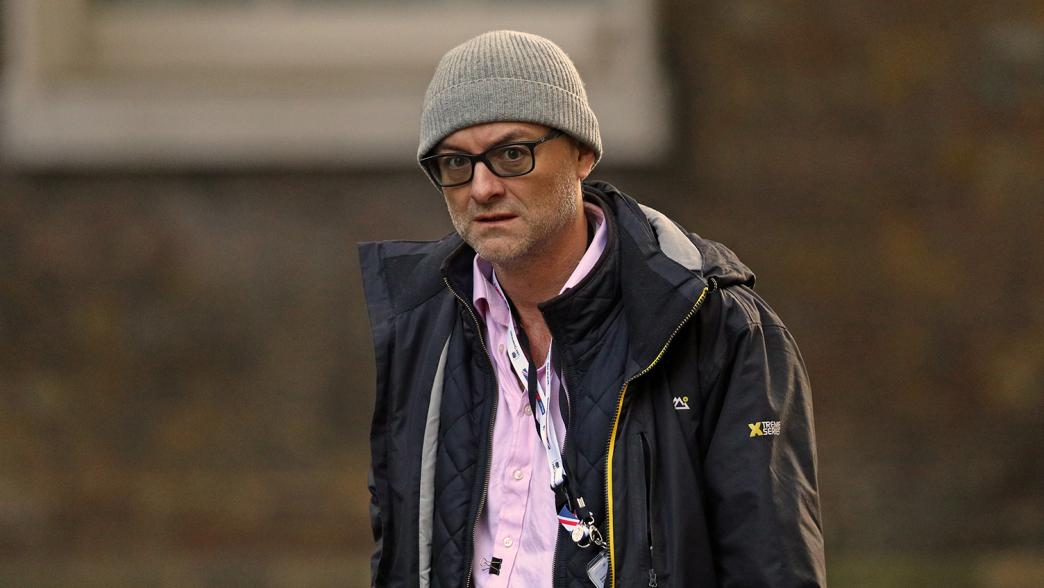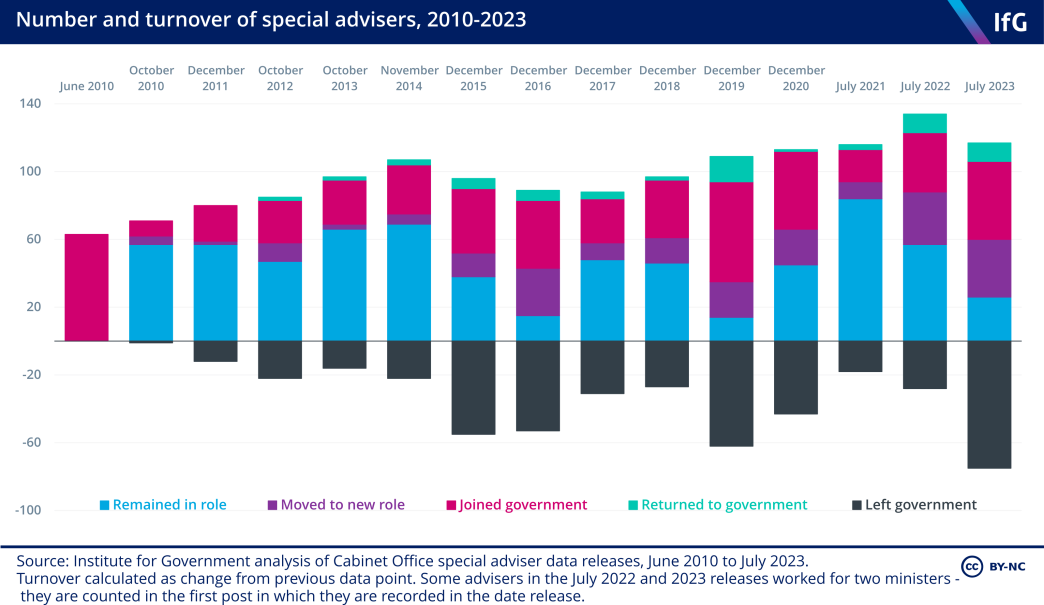Special advisers
Special advisers (SpAds) are political appointees hired to support ministers.

What is a special adviser?
Special advisers (SpAds) are political appointees hired to support ministers. They give party political advice and support that would be inappropriate for the civil service to provide.
SpAds are a specific kind of political adviser first introduced in 1964. They are appointed as a temporary civil servant. Other political advisers include those working for a political party, or the equivalent to special advisers who work for the opposition (sometimes referred to as pads). 'Policy adviser' is a catch-all term for anyone providing policy advice.
SpAds can be policy experts, recruited for their expertise in a particular field, or media advisers who present their minister's views and influence how policy is communicated to the public.
SpAds serve the minister who appointed them or No.10 directly if they are working there. All special advisers are expected to serve the prime minister and the rest of government beyond their department. However, there was a marked increase in central oversight of special advisers under the Johnson government.
How are special advisers appointed?
Cabinet ministers hire their special advisers, but the prime minister approves all appointments. Special advisers often have close working relationships with their ministers and some continue to advise the same minister as they move between briefs.
There is no set process for recruiting SpAds. Some will have worked for the political party as an adviser. Others will have been recruited through word of mouth. Special adviser roles are not normally advertised. In January 2020, the prime minister’s then chief adviser, Dominic Cummings, wrote a blogpost asking people to send him a CV if they wanted to work in No.10. This approach is contrary to civil service recruitment practice. It is not known whether any advisers were recruited as a result of his blog.
In February 2020, the Conservative Party also created 'spadjobs.uk', a website soliciting job applications to become a special adviser. The website called for 'talented and experienced communications and digital professionals' to apply to media and digital special adviser roles, setting out job responsibilities and desired qualities of applicants. The then cabinet secretary, Sir Mark Sedwill, later confirmed to a select committee that the website was run and paid for by the Conservative Party and that any advisers identified through the website would be appointed to their roles ‘on a government mechanism’. 10 Public Administration and Constitutional Affairs Committee, Oral evidence - The work of the Cabinet Office, HC118, March 2020 (available at committees.parliament.uk/oralevidence/164/default/)
There is a process for entering government: special advisers have to abide by a code of conduct, sign a contract and declare any conflicts of interests or any personal history that could detrimentally affect their ability to do the job. They will have to pass security clearance depending on what level of access the job requires.
How many special advisers are there?

The latest data release in July 2023 revealed there were 117 special advisers in government as of 31 March 2023 – a decrease from 126 the previous summer. 14 Cabinet Office, Annual Report on Special Advisers 2023, 20 July 2023, assets.publishing.service.gov.uk/government/uploads/system/uploads/attachment_data/file/1171958/Annual_Report_on_Special_Advisers_2023.pdf 75 special advisers left between the July 2022 publication and March 2023, reflecting the end of the Johnson administration. 46 of the special advisers serving in March 2023 had joined government for the first time since the previous publication, one of the biggest influxes in recent years.
The prime minister always has the largest number of special advisers. In March 2023, Rishi Sunak had 41 advisers, a similar number to Boris Johnson’s last published number of 43. The ministerial code says that cabinet ministers can appoint two special advisers unless the prime minister allows them to appoint more – in July 2023, many including the foreign secretary, home secretary and chancellor of the Duchy of Lancaster had more than two advisers.
The number of special advisers in government has drastically increased since the 1990s, when John Major’s government recruited between 34 and 38 at any one time. Tony Blair recruited between 70 and 84, and Gordon Brown between 73 and 74.
What do special advisers do?
The special adviser code of conduct lists the kinds of activities SpAds will undertake for ministers:
- give assistance on any aspect of departmental business, and give advice (including expert advice as a specialist in a particular field)
- undertake long-term policy thinking and contribute to policy planning within the department
- write speeches and undertake related research, including adding party political content to material prepared by permanent civil servants
- liaise with the party, briefing party representatives and parliamentarians on issues of government policy
- represent the views of their minister to the media (including a party viewpoint), where they have been authorised by the minister to do so
- liaise with outside interest groups (including those with a political allegiance).
How powerful are special advisers?
In Number 10, special advisers are the prime minister’s most senior advisers, often including his or her chief of staff, director of communications or, under Boris Johnson, the head of the Policy Unit. Others can be very powerful even if they do not have a specific role. Before he left in November 2020, Dominic Cummings was referred to as the prime minister’s ‘chief adviser’ and seems to have had a wide but unspecified brief. Liam Booth-Smith is chief of staff to Rishi Sunak – he was part of the team of advisers who worked for Sunak when he was chancellor of the exchequer.
Some special advisers can wield more influence within a department than junior ministers. Special advisers are highly trusted by the secretary of state, whereas junior ministers are appointed by the prime minister, and often do not have an established relationship with the secretary of state. Former home secretary Alan Johnson described the close relationship between secretaries of state and their SpAds:
“They’re your personal appointments and therefore you’ve got a closeness to them and a faith in them, a confidence in them that is crucial in this cold, harsh world that you’re dealing with. You trust them.”
This close relationship often receives criticism from both inside and outside of government. Former commercial secretary to the Treasury Lord O’Neill explained this attitude:
“You get all these young bright things who have no accountability really to anybody other than the Secretary of State, and so there’s the Whitehall bubble and then there’s another bubble inside it and they all surround each other in this intense working mode and dream up idea after idea and try to pursue them, without always road-testing things in the real world.”
Some SpAds will have close relationships with the media and often brief it on the minister’s behalf – they are assumed to have the ministers’ permission to do so, though it may not always be explicit. In 2014, Fiona Cunningham (later Hill) had to resign as a special adviser to Theresa May in the Home Office after a letter was leaked to the media that was critical of the then education secretary, Michael Gove.
There are restrictions on what a special adviser can and cannot do. Special advisers cannot exercise any statutory powers, manage public funds or ask civil servants to do anything which might breach the civil service code. They are restricted from personnel matters or the management of the civil service.
How much are special advisers paid?
Special advisers are paid from government funds. The total cost of special adviser salaries, pension contributions and severance costs during the 2022/23 financial year was £15.9 million. This included £1.9m in severance costs for special advisers in Boris Johnson’s government and £1m for those in Liz Truss’s government. The salary for a special adviser ranged from £40,500 to £145,000 a year in 2022/23.
What happens to special advisers during elections and when they leave government?
Special advisers lose their jobs if their minister is removed at a reshuffle, or at any other time, or if a general election is called. Some may stay in government and work for another minister. Those that leave are usually provided with severance pay, which is generally between three and six months’ salary. In financial year 2021/22, the government spent £99,000 on severance pay for SpAds. In March 2020, Boris Johnson issued a ministerial direction that the government should defend a legal case brought by former special adviser Sonia Khan, who was fired by Dominic Cummings, regarding her dismissal, rather than seek a settlement. The case was ultimately settled in November 2020, with Ms Khan receiving a large settlement from the government. 15 Swinford S, 'Settlement for Sonia Khan, adviser marched out of No 10', The Times, 13 November 2020, retrieved 15 September 2022, www.thetimes.co.uk/article/settlement-for-sonia-khan-adviser-marched-out-of-no-10-gkt56d6jn
Special advisers are subject to civil service rules on business appointments. When senior SpAds leave office, they must seek advice from the Independent Advisory Committee on Business Appointments (ACOBA) regarding future employment or appointment.
Some special advisers run to become MPs in parliament – Ed Miliband, Matt Hancock and Oliver Dowden all served as special advisers prior to their election; David Cameron had been a special adviser in the early 1990s. The special advisers' code specifically allows SpAds to run for office while in their position. Some have been given peerages on leaving government – such as Baroness Vadera, former adviser to Gordon Brown, and Baroness Finn, former adviser to Francis Maude.
How are special advisers held accountable?
Special advisers are governed by a code of conduct. They are accountable to their ministers for their conduct.
Controversially, Dominic Cummings was not asked to resign by Boris Johnson after it was revealed in May 2020 that he had made a trip from London to Durham during the lockdown imposed by the Covid-19 pandemic. He later left Downing Street alongside then Number 10 director of communications Lee Cain in late 2020.
However Allegra Stratton – special adviser and spokesperson for COP26 – resigned after a clip was released of her joking about an alleged Christmas party in No.10 in 2020, while the rest of the country were facing tough Covid-19 restrictions.
On 3 February 2022, Dan Rosenfield, Boris Johnson’s chief of staff also resigned, along with two other senior special advisers. In December 2021, it had been reported that Rosenfield had attended at least one of the Downing Street Christmas parties in 2020. 16 Tories held ‘up to seven’ parties in lockdown’, The Times, 9 December 2021, retrieved 4 February 2022, www.thetimes.co.uk/article/no10-christmas-party-wine-gifts-quizzes-boris-johnson-allegra-stratton-vdbpghr52 There have been no reports of special advisers resigning because of conduct issues in recent months.
- Topic
- Ministers
- Keywords
- Cabinet Government reshuffle
- Position
- Special adviser
- Publisher
- Institute for Government